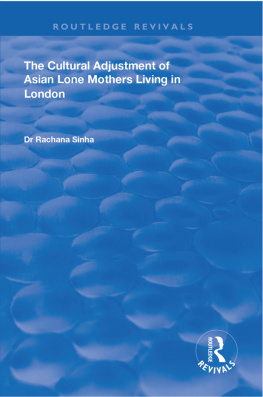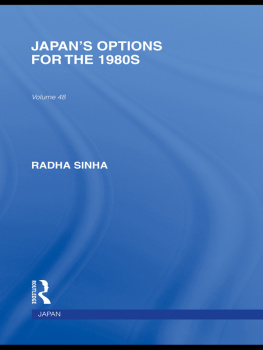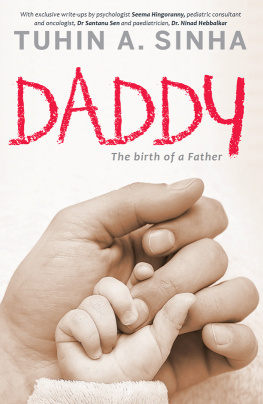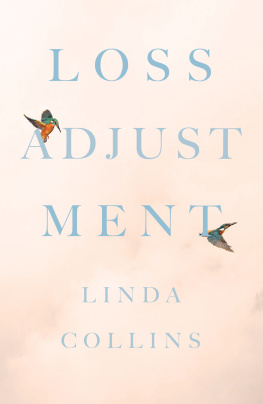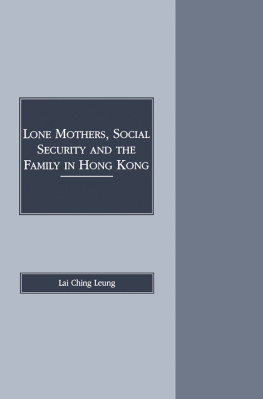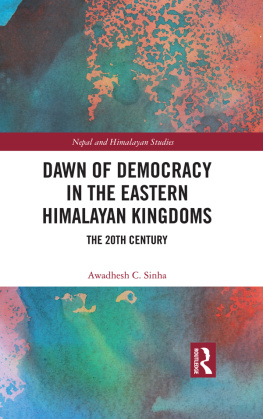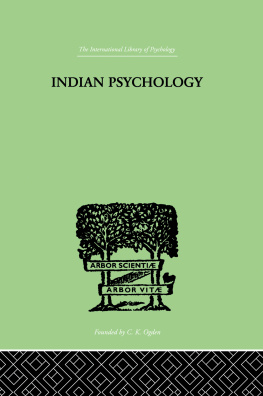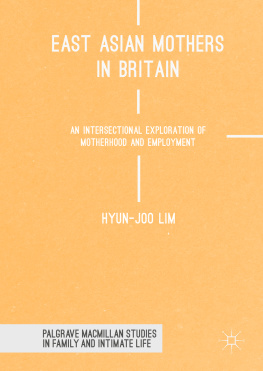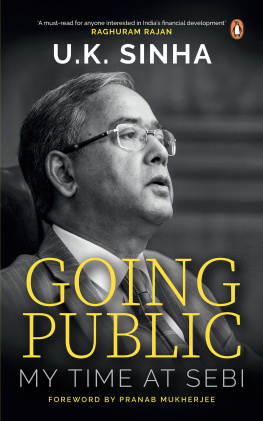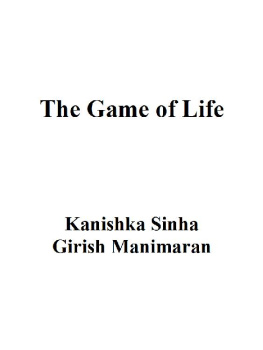THE CULTURAL ADJUSTMENT OF ASIAN LONE MOTHERS LIVING IN LONDON
This book is dedicated to my parents and brother
The Cultural Adjustment of Asian Lone Mothers Living in London
DR RACHANA SINHA MA.PhD
First published 1998 by Ashgate Publishing
Reissued 2018 by Routledge
2 Park Square, Milton Park, Abingdon, Oxon, OX14 4RN
711 Third Avenue, New York, NY 10017, USA
Routledge is an imprint of the Taylor & Francis Group, an informa business
Copyright Rachana Sinha 1998
All rights reserved. No part of this book may be reprinted or reproduced or utilised in any form or by any electronic, mechanical, or other means, now known or hereafter invented, including photocopying and recording, or in any information storage or retrieval system, without permission in writing from the publishers.
Notice:
Product or corporate names may be trademarks or registered trademarks, and are used only for identification and explanation without intent to infringe.
Publishers Note
The publisher has gone to great lengths to ensure the quality of this reprint but points out that some imperfections in the original copies may be apparent.
Disclaimer
The publisher has made every effort to trace copyright holders and welcomes correspondence from those they have been unable to contact.
A Library of Congress record exists under LC control number: 98074123
ISBN 13: 978-1-138-33874-6 (hbk)
ISBN 13: 978-1-138-33875-3 (pbk)
ISBN 13: 978-0-429-44147-9 (ebk)
This book primarily attempts to examine how 90 Asian lone mothers from the Indian and African sub-continent living in London in 1993 resolve their two situational difficulties firstly that of being lone mothers, and secondly that of being of ethnic origin. A secondary aim of the research is to compare the material and living conditions of the Asian lone mothers with those of their British counterparts, although this can only be tentatively done, given the small size of this sample.
The culture conflict thesis discussed in the first chapter argues that an ethnic population will inevitably encounter adjustment problems as a result of cultural differences and the possible conflict of interests between them and the host society. The literature in shows that the Asian culture is far more traditional than the British culture regarding issues such as marriage, the family, the position of women, marriage breakdown and lone parenthood.
Evidence from this study suggests that although most of the women acknowledged that these cultural differences could cause them difficulties, this did not necessarily mean that all their experiences of lone parenthood were negative. Even though the majority of the mothers no longer saw the father, they did not feel that they were isolated from their family and friends or the local community, with whom they shared amicable relationships, in addition to receiving various types of support.
Most of the respondents also claimed that they had culturally adjusted to their immigrant status, with none of them being totally assimilated into the British way of life. Despite the fact that many of the women were suffering from some mental and emotional complaints, their general outlook was largely positive. Finally it was found that many of the living conditions of this sample were similar to those of the national lone parent population.
I would like to convey my special thanks to everyone who has offered me their support following my decision to undertake this research. Firstly, my deepest gratitude must go to my supervisor, Professor Vic George, who has guided me throughout the last few years, whilst successfully helping me to overcome any of the difficulties I faced. I have very much appreciated his unfailing encouragement, advice and valuable suggestions, as well as his patience in reading through my drafts.
My thanks go to all the Asian lone mothers, without whose co-operation this study would not have been possible, and to the various womens centres and other agencies who so enthusiastically helped in providing me with my sample.
Finally, I would like to take this opportunity of thanking my parents and my brother for their unfaltering support in inspiring me to continue and complete the writing of this book.
The main purpose of this research is to investigate whether Asian lone mothers living in London face and experience additional problems to British lone mothers because of their different ethnic and cultural background. A subsequent aim of the study is to compare the standards of living between the two groups of women This kind of research inevitably has policy implications, whichshall also be drawn out from the relevant findings.
In Britain today the typical household consisting of a married or co-habiting couple and their children is increasingly being challenged by the growing prevalence of lone parent families, the proportion of which rose from nearly 8 per cent in 1971 to 22 per cent in 1993. The overwhelming majority of lone families are headed by mothers, with only ten per cent of such families headed by fathers (OPCS 1996:54). The recent demographic changes have, therefore, meant that fewer women now have lives which fit the conventional assumptions on which social policy has traditionally been based.
According to Morgan, current discussion of family affairs is heavily focused on lone parents, and a plethora of reports now dwell upon their disadvantaged position and how this might be addressed (1995:1). Most studies of lone parenthood in this country, however, tend to be both partial and over-generalised, and based on predominantly white samples, with the result that they have treated the lone parent population as a homogeneous group. Despite the fact that some researchers have included ethnic participants in their recent large scale surveys (Bradshaw and Millar 1991, McKay and Marsh 1994), their numbers have, on the whole, been negligible, so that any problems which may be specific to their group remain largely hidden.
This study proposes to bridge this gap of knowledge by focusing exclusively on Asian lone mothers from the Indian and African subcontinent, who have largely been ignored by investigators to date. Although there may be some similarities in the experiences of British and Asian lone mothers, in that most of them live in a constant state of poverty and are heavily dependent on the state for their incomes, the Asian women may face additional difficulties due to their primarily dissimilar cultural backgrounds.
The first chapter of this book begins with a review of the various models of race relations developed over the years to conceptualise the conflict of relationships between the immigrant and the host nation. Although they differ in their perceptions and resolutions of the problem, all the models show that culture conflict is an inevitability in a society with an ethnic population..
examines the types of adjustments the women have had to make, both culturally as immigrants living in London and psychologically as lone mothers. The final chapter concludes by summarising the major findings of the study whilst analysing the implications of lone parenthood for the 90 women in the sample.
Being one of only a few investigations devoted to Asian lone mothers in Britain, this project will try to shed some light on the cultural problems they may encounter, and will hopefully be a step in the right direction in acknowledging that this specific group is now worthy of serious study in their own right.


